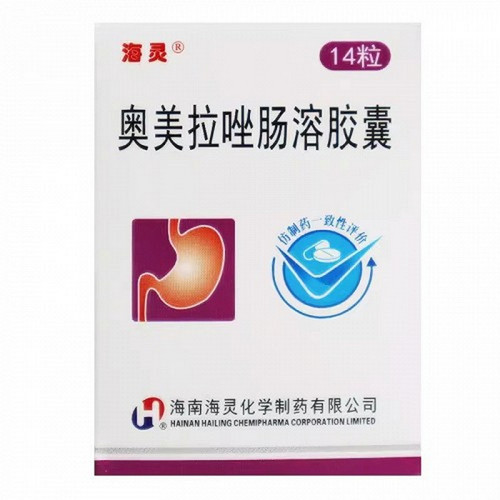Product Overview
[Drug Name]
Generic Name: Omeprazole Enteric-Coated Capsules
Trade Name: Shanmushi Omeprazole Enteric-Coated Capsules 20mg x 30 capsules
Pinyin Code: ShanMuShi AoMeiLaZuoChangRongJiaoNang
[Main Ingredient]
The main ingredient of this product is omeprazole.
[Properties]
This product contains white or off-white enteric-coated pellets or granules.
[Indications/Main Functions]
Indicated for gastric ulcers, duodenal ulcers, stress ulcers, reflux esophagitis, and Zollinger-Ellison syndrome (gastrinoma).
[Specifications]
20mg x 30 capsules
[Dosage and Administration]
Oral. Adults: 1 capsule once daily (every 24 hours). Take an additional capsule if necessary. Take with warm water. This product must be swallowed whole. Do not chew or crush. Do not crush this product with food.
[Adverse Reactions]
Common adverse reactions to this product include headache, diarrhea, nausea, vomiting, constipation, abdominal pain, and bloating. Occasionally, dizziness, drowsiness, fatigue, sleep disturbances, paresthesias, rash, itching, urticaria, and abnormal liver function tests may occur. Rarely, hyperhidrosis, peripheral angioedema, hyponatremia; angioedema, fever, and anaphylactic shock; leukopenia, thrombocytopenia, agranulocytosis, and pancytopenia; reversible mental confusion, irritability, depression, aggression, and hallucinations; gynecomastia; dry mouth, taste disturbances, stomatitis, and candidiasis; alopecia, photosensitivity, and erythema multiforme; hepatic encephalopathy (in patients with preexisting severe liver disease), icteric or non-ictal hepatitis, and liver failure; bronchospasm; arthralgia, myalgia, and muscle fatigue; interstitial nephritis; and blurred vision.
[Contraindications]
This product is contraindicated in patients with allergies, severe renal impairment, and infants.
[Precautions]
1. Use with caution in patients with renal insufficiency or severe hepatic insufficiency. 2. Effects of the drug on diagnosis: ① Omeprazole can inhibit gastric acid secretion, increasing gastric pH. This can trigger G cells in the gastric mucosa to secrete gastrin, thereby increasing blood gastrin levels. ② Omeprazole can cause false-negative results in the 13C-urea breath test (UBT). This may be due to omeprazole's direct or indirect inhibitory effect on Helicobacter pylori (Hp). Clinically, the 13C-urea breath test should not be performed for at least 4 weeks after omeprazole treatment. 3. Items that should be checked or monitored before, during, and after medication use: ① Efficacy monitoring: When treating peptic ulcers, endoscopic examination should be performed to determine if the ulcer has healed. ② For the treatment of H. pylori-related peptic ulcers, a UBT test can be performed 4 to 6 weeks after treatment to determine whether H. pylori has been eradicated. ② For the treatment of Zollinger-Ellison syndrome, basal gastric acid secretion should be tested to see if it is less than 10 mEq/h (i.e., the treatment target). ② For toxicity monitoring, liver function should be checked regularly. Long-term users should regularly check the gastric mucosa for tumor-like hyperplasia, and those who have used the drug for more than 3 years should also monitor serum vitamin B12 levels. 4. When treating gastric ulcers, the possibility of cancer should be ruled out before using this drug, as treatment with this drug can alleviate symptoms and thus delay treatment. 5. To prevent excessive acid suppression, long-term, high-dose use of this drug is not recommended for the treatment of general peptic ulcers (except in the case of Zollinger-Ellison syndrome).








